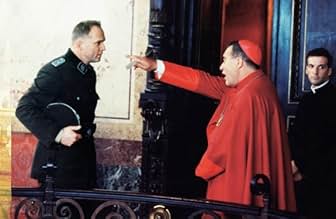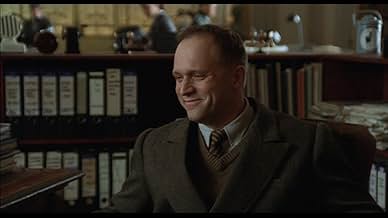Seconda guerra mondiale: l'ufficiale delle SS Kurt Gerstein cerca di informare Papa Pio XII degli ebrei inviati nei campi di sterminio. Il giovane sacerdote gesuita Riccardo Fontana lo aiuta... Leggi tuttoSeconda guerra mondiale: l'ufficiale delle SS Kurt Gerstein cerca di informare Papa Pio XII degli ebrei inviati nei campi di sterminio. Il giovane sacerdote gesuita Riccardo Fontana lo aiuta nella difficile missione di informare il mondo.Seconda guerra mondiale: l'ufficiale delle SS Kurt Gerstein cerca di informare Papa Pio XII degli ebrei inviati nei campi di sterminio. Il giovane sacerdote gesuita Riccardo Fontana lo aiuta nella difficile missione di informare il mondo.
- Regia
- Sceneggiatura
- Star
- Premi
- 4 vittorie e 9 candidature totali
Recensioni in evidenza
The murder of his niece and the Jews appalls his Christian conscience. His wincing reaction whilst looking through the gas chamber spy-hole is well-acted. He alerts the Swedes and the Catholic Church, hoping that international pressure will awaken the German conscience. Catholic opposition has stopped the euthanasia programme and this can be mobilised to help the Jews.
In reality, Gerstein's options are limited. His own church leaders react mutely to his news of mass-murder. They caution restraint. Nazi indoctrination is trying to turn everyone into a rabid anti-Semite - as shown comically with Gerstein's youngest son giving annoying Hitler salutes. Most Protestants agree to join the new Nazi-sponsored 'Reich Church', happily reconciling faith with Nazism. Similarly, the 1933 Concordat with Hitler gave the Catholic Church a precarious protection as long as it stayed out of politics.
Carpet-bombing of German cities is killing women, children and babies. German forces are engaged in a titanic struggle against the 'forces of international Jewry ' - Russian Communism and American Capitalism. Facing this kind of mind-set and mass paranoia, the Jews needed a miracle. Saving mentally-handicapped members of German families is one thing. Saving a long-despised race thought to be the root cause of every world problem is very much another.
Gerstein's attempts to alert the Vatican are channelled through an invented character, a young Catholic priest who symbolises the conscience of thousands of individual Catholics who risked their lives to help Jews. He eventually sacrifices himself at Auschwitz, a Christ-like figure who 'redeems' his religion in the face of a terrible evil.
The controversial Pope Pius XII is portrayed in a curiously anodyne way - to the distaste of those who regard him as a Nazi sympathiser. The Vatican's fear of Communism, its efforts to hide Italian Jews and its self-preservation instinct in facing the Nazis are all clearly demonstrated. As is the help it gave to individual SS men on the run after the war. One is left to make up one's own mind about the Pope.
In truth, neither the Church nor the SS were monolithic organisations. Both were composed of individuals, good and bad. One reason for death factories was to save SS men from the horrors of mass-shootings. They offered a 'sanitised' method of killing, just as the 1933 Concordat offered a sanitised way for Nazism and Catholicism to relate to each other. Problems arose for individuals who had to make moral choices in carrying out these policies.
The controversial Roman lunch scene depicts the American ambassador discussing the fate of the Jews with Vatican big-wigs. Against a wonderful panoramic backdrop of the eternal city, they enjoy an excellent sea food meal. The American points out that finding an alternative home for millions of Jews would cause great problems. Nazi retaliation would only make things worse, counters a Vatican big-wig. A far cry from the cattle trucks rolling to and fro, emptying Europe of its Jews. This is a 'cheap shot' - decision-makers usually enjoy better material conditions than the rest of us. One can imagine Churchill discussing sensitive topics in a cold-blooded way over many a fine meal. It makes for good cinema, though!
This is an excellent film which covers a vast topic in 2 hours. It does not make judgements about Gerstein or the Christian churches. The Gerstein character is a complex one as is the Christian response to the Holocaust. It shows how difficult it is to 'buck the system' during wartime. Gerstein arrives at Auschwitz with the comforting knowledge that the allies 'never bomb the camps' - they know they are full of 'POW's'. Would prolonged bombing of the railways to the death camps have made a difference? Many Jews believe that this could and should have happened.
Should the allies have re-directed their military efforts to save Jews rather than merely fight the Nazis? Unfortunately, the 1930's and World War 2 had de-sensitised people to civilian suffering - newsreels from China, Abyssinia, Guernica; the Nazi bombing of Warsaw, Rotterdam, London, Coventry, the V1 and V2 attacks of 1944. World War I blurred the line between soldiers and civilians. World War 2 completely obliterated this distinction - on both sides of the conflict. Axis forces brought death to millions of Chinese and Russian civilians. The Allied bombing of Germany, Japan and northern France all produced heavy civilian casualties. Is there an essential difference between mass-bombing and the Holocaust?
European anti-Semitism aided the Holocaust. The miracle is that so many individual Gentiles did so much to aid Jews. Nazism put new ideas about human rights to the test. Governments and organisations may have been found wanting especially Vichy France. Individuals - including many brave Germans responded magnificently. This is the 'positive' side of the Holocaust which we should remember and treasure. Gerstein did his best to sabotage and stop the killing machine he became part of. The film allows us to make up our own minds about whether he and the Catholic Church did enough.
The one dimensional nature of the main characters works very well - we see but a snapshot of the complexity of human nature and this begs you to ask the question of what would you do if you found yourself placed in such circumstances.
This is perhaps a trademark of Costa-Gavras's work (Mad City, Missing and Z in particular)
It is not just a cold view of the history of the time nor is it seeking to provide an answer to the big question - just shed light on the circumstances and on human nature.
Another perfect performance is given by the priest who tries to help the German officer. Mathieu Kassovitz (who also played the male leading role in 'Le Fabuleux destin d'Amélie Poulain')is very convincing in his role.
I think this movie is highly underrated. Costa-Gavras has made an important movie with 'Amen.' which looks at the holocaust-tragedy from another point of view which is seldom showed. The movie gives a true although unbelievable answer at one of the most important questions concerning the holocaust: didn't anyone saw this coming? Couldn't anyone prevent this from happening?
If you really want to know the answers to this questions, you certainly have to watch 'Amen.'. This movie should at least have an 8 and I'll give you two reasons why: one because the story is unique and magnificently told; and two because the two leading actors are giving the performance of a lifetime. Highly recommendable!
9/10
Lo sapevi?
- QuizStefan Lux was a Jewish Czech journalist, who committed suicide in the general assembly room of the League of Nations during its session on July 3, 1936, to alert the world on the perils of German anti-Semitism. After shouting "C'est le dernier coup" ("This is the final blow") he shot himself with a revolver.
- BlooperIn one of the scenes they say that the Treblinka camp is out of gas, referring to Zyklon B. Treblinka didn't use Zyklon B, instead they used carbon monoxide.
- Citazioni
[first lines]
Stephan Lux: [interrupting a session of the Assembly of the League of Nations, Geneve, 1936] My name is Stephan Lux. I am Jewish. The Jews are being persecuted in Germany and the world doesn't care.
[He draws a pistol]
Stephan Lux: I see no other way to reach people's hearts.
[He shoots himself]
- ConnessioniReferenced in Kaamelott: Amen (2005)
- Colonne sonoreThe Train I /II
Composed and arranged by Armand Amar
Orchestra:
Jean-Philippe Audin, Elsa Benabdallah, Igor Boranian, Fabien Boudot, Florent Bremond, Karen Brunon, Nathalie Carlucci, Hervé Cavellier, Emmanuel Gaugué, Thierry Köhl, Julien Leenhardt, Bobin Minalli Bella, Marthe Moinet, Yves Monciero, Philippe Morel, Amèlie Paradis, Emmanuel Raynaud, Alexandre Sauvaire
(P) & © 2002 Long Distance/France
I più visti
- How long is Amen.?Powered by Alexa
Dettagli
- Data di uscita
- Paesi di origine
- Siti ufficiali
- Lingue
- Celebre anche come
- Âmin
- Luoghi delle riprese
- Aziende produttrici
- Vedi altri crediti dell’azienda su IMDbPro
Botteghino
- Budget
- 103.000.000 FRF (previsto)
- Lordo Stati Uniti e Canada
- 274.299 USD
- Fine settimana di apertura Stati Uniti e Canada
- 16.284 USD
- 26 gen 2003
- Lordo in tutto il mondo
- 8.419.052 USD
- Tempo di esecuzione
- 2h 12min(132 min)
- Colore
- Mix di suoni
- Proporzioni
- 1.85 : 1





















